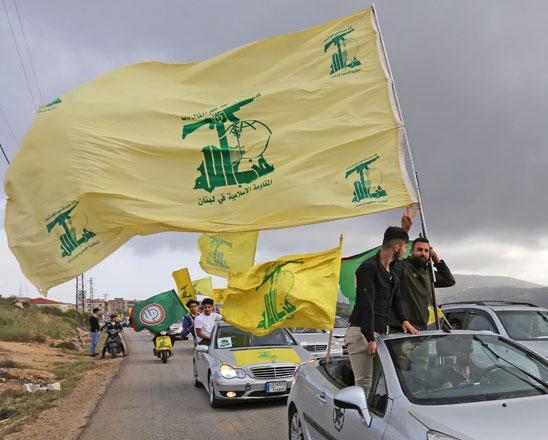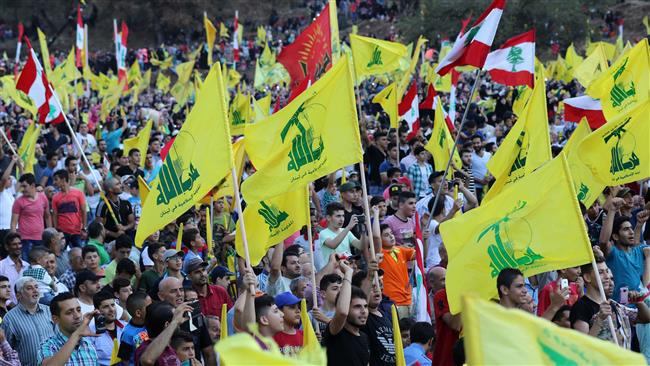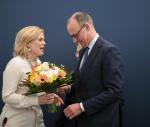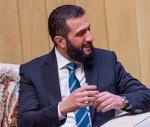You are here
An Assad ally plots a comeback in Lebanese election
By Reuters - May 03,2018 - Last updated at May 03,2018
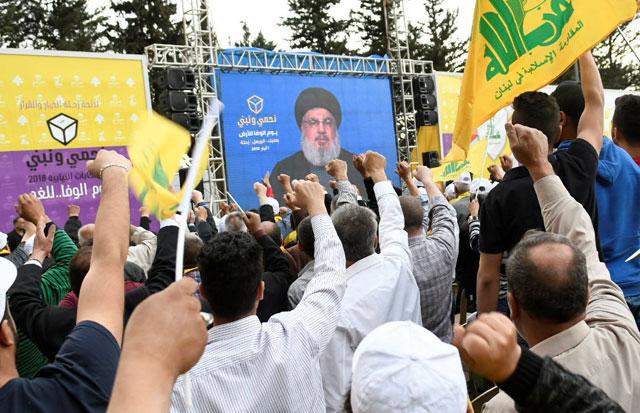
Hizbollah leader Sayyed Hassan Nasrallah is seen on a screen during election rallies a few days before the general election in Baalbeck, Lebanon, on Tuesday (Reuters photo)
NABI AYLA, Lebanon — A friend of Syrian President Bashar Al Assad who was once one of Lebanon’s most powerful men is trying to make a comeback, with the backing of the Iran-backed Hizbollah movement.
Jamil Al Sayyed rose to become Lebanon’s feared intelligence chief during Syria’s 15-year domination of the country after its 1975-90 civil war. He quit in 2005, weeks after former Prime Minister Rafik Al Hariri was assassinated, and spent four years in jail until he was released without charge over his killing.
Now 68, the retired general and former spymaster is running on Sunday in Lebanon’s first parliamentary election since 2009.
Prime Minister Saad Al Hariri, a Sunni Muslim, is expected to remain in power though he is likely to lose some seats to rivals including candidates allied to Hizbollah.
But Hariri, who is backed by the West and leads a government that includes Hizbollah and nearly all of Lebanon’s other main parties, has signalled his concern by indirectly identifying Sayyed as “Bashar Al Assad’s candidate”.
The Baalbek-Hermel constituency in eastern Lebanon, where Sayyed is running as an independent candidate, has become one of the most important battlegrounds in the election.
Sayyed says Hizbollah’s opponents have chosen it “as a point of confrontation”.
“I am an independent but not neutral,” Sayyed told Reuters in an interview in his home village of Nabi Ayla in the fertile Bekaa Valley.
Making clear his allegiance is with Hizbollah, he said: “I have firm political convictions in support of the resistance.”
Hizbollah leader Sayyed Hassan Nasrallah has said he will go to the district if necessary to support Hizbollah and its allies against Hariri’s Future Movement and the Lebanese Forces Party led by Samir Geagea, a former Christian militia leader.
Sayyed’s critics say his potential comeback and that of his wartime opponents from the anti-Syria camp, such as Geagea, could entrench old divisions. One of the biggest anti-Syria dissidents of that time, Christian politician Michel Aoun, is now president of the country of 4 million.
But Sayyed said he was unfazed that Lebanon is mostly run by leaders from the civil war era.
“I know their secrets and what they hide — their history — because I worked as required in the state in security, in politics,” he said.
Criticism of Washington
Sayyed criticised US financial support for the Lebanese army, saying it was intended to provoke a confrontation with Hizbollah, which Washington considers a terrorist organisation.
But he said the Lebanese army and Hizbollah continue to operate in such a way as to complement each other. Hizbollah remained “a necessity [for the army] all the while the West and America do not supply the army with necessary deterrent capabilities”, he said.
Sayyed’s candidacy in the election has revived memories of a turbulent period which ushered in a sometimes violent power struggle between allies and opponents of Damascus.
If he makes it into parliament, he could become a candidate to one day succeed Nabih Berri as the assembly’s speaker — a post reserved for a Shiite in Lebanon’s sectarian power-sharing system.
At the peak of his influence, Sayyed inspired fear among opponents of Syrian influence in Lebanon. A career soldier, he was central to what critics saw as a Syria-controlled security order that suppressed voices opposed to Syrian dominance.
Sayyed shaped the politics of that era alongside top Syrian officials and Lebanese leaders, many of them militia leaders from the 1975-90 conflict.
At the time of Rafik Hariri’s killing, Sayyed was head of the general security directorate intelligence agency.
He was the most powerful of four Lebanese generals detained in 2005 at the request of Detlev Mehlis, the German prosecutor who headed the early stages of the UN investigation into the assassination and implicated Syrian and Lebanese figures.
A UN-backed tribunal ordered their release in 2009 for lack of evidence and has charged five members of Hizbollah over the assassination. Hizbollah denies any role in the killing.
Related Articles
BEIRUT, Lebanon — Hizbollah and its political allies won just over half the seats in Lebanon’s parliamentary election, unofficial results sh
Several prominent Lebanese politicians and media figures opposed to Syria’s regime and its ally Hizbollah have been threatened, the official National News Agency (NNA) reported on Sunday.
BEIRUT, Lebanon — Lebanon’s parliament is set to re-elect Nabih Berri as its speaker on Wednesday, extending the veteran politician’s tenure


